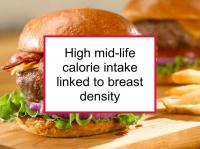A new prospective study has reported that calorie intake during mid-life influences breast density measured 15 years later. The study was designed to investigate the role of calorie intake and dietary patterns during childhood, as well as adulthood, on subsequent mammographic breast density, a strong breast cancer risk factor.
The study included 1,161 U.K. women who had been followed since their births in 1946. Diet at age four was determined by 24-hour recall. During adulthood, average diet at ages 36 and 43 years was assessed using five-day food records.
Four main dietary patterns were found among the study participants: (1) high fat, high sugar; (2) low fat, high fiber; (3) alcohol and fish; and (4) meat, potatoes, and vegetables.
No association was found between dietary pattern at age four and breast density in adulthood. However, a diet high in calories in adulthood was found to be linked to higher breast density. The effect of the high fat and sugar dietary pattern was similar (after adjusting for calorie intake). No associations were found between breast density and the other dietary patterns (low fat, high fiber; the alcohol and fish; or meat, potatoes, and vegetables).
The results suggest that both a high calorie diet (regardless of the source of the calories) and a diet high in both fat and sugar during middle age can contribute to increased postmenopausal breast density, thereby increasing breast cancer risk.
